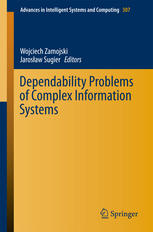

Most ebook files are in PDF format, so you can easily read them using various software such as Foxit Reader or directly on the Google Chrome browser.
Some ebook files are released by publishers in other formats such as .awz, .mobi, .epub, .fb2, etc. You may need to install specific software to read these formats on mobile/PC, such as Calibre.
Please read the tutorial at this link: https://ebookbell.com/faq
We offer FREE conversion to the popular formats you request; however, this may take some time. Therefore, right after payment, please email us, and we will try to provide the service as quickly as possible.
For some exceptional file formats or broken links (if any), please refrain from opening any disputes. Instead, email us first, and we will try to assist within a maximum of 6 hours.
EbookBell Team

4.7
76 reviewsThis monograph presents original research results on selected problems of dependability in contemporary Complex Information Systems (CIS). The ten chapters are concentrated around the following three aspects: methods for modelling of the system and its components, tasks – or in more generic and more adequate interpretation, functionalities – accomplished by the system and conditions for their correct realization in the dynamic operational environment. While the main focus is on theoretical advances and roadmaps for implementations of new technologies, a much needed forum for sharing of the best practices is also presented.
CIS systems, being the most complex yet most reliable technical structures engineered by man, present many challenges throughout their lifecycle. Difficulties in modelling, design, implementation and maintenance come not only from involved, widely distributed technical and organizational structures (comprising both hardware and software resources), but even more from complexity of the information processes (data processing, monitoring, resource allocation, dynamic reconfiguration, etc.) which are realized in the operational, often hostile environment. Furthermore, all the issues need to be dealt with taking into account a number of additional factors, such as uncertainties of human interactions, safety criteria and security demands or economic and environmental constrains.